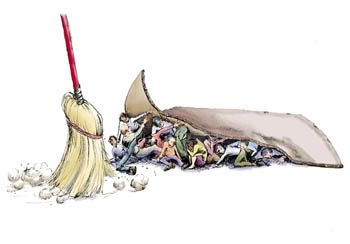
Dr Dork is angry.
Morbidity - a measure of disease prevalence or incidence
Mortality - a measure of death.
Prevalence - the amount of disease at a given time
The psychiatric illness category with the highest mortality rate, generally thought around 20 %, are the eating disorders. Anorexia nervosa particularly. About 1 in 5 people with this condition will die as a result. Public hospitals have no facilities to treat eating disorders in the state Dr Dork works in. You can only get treatment if you are privately insured.
The highest morbidity is for mood disorders. A 2003 study in NSW found 3.2 % point prevalence. (J Affect Disorder 2003 Jul;75(2):155-62).
That is, at any one given moment, about 1 in 30 people have clinical depression.
The prevalence per year is 1 in 5. The lifetime prevalence is generally given as 20 to 30 %. It's hard to measure. Recall bias. It's possibly even more.
Suffice it to say, this is a very common problem.
But it is politically unattractive. Depression is rarely easy to treat. It often takes a long time.It is a complex, multifactorial illness. It is stigmatised.
Dr Dork likes to refer to antidepressant medications as emotional anaesthetics. They certainly have their role. He prescribes them not infrequently.
But very rarely are they a cure. The other critical modality of treatment is psychotherapy. This can be given by psychiatrists or clinical psychologists. Not by someone with a high school diploma and a 10 week "counselling course". It may involve a few weeks, or many months, even years of treatment.
There is virtually no public funding for clinical psychs. Psychiatrists are overburdened with managing more overtly biological illness such as psychosis and bipolar disorder. Most choose not to do psychotherapeutic treatment. That in itself is a rant for another day. Dr Dork thinks "biological psychiatrists" are kidding themselves.
This is a growing problem. Especially in men, who are unlikely to seek treatment. They get angry, or hide in a bottle.The Aussie bloke is "macho" personified.
Dr Dork doesn't have an easy solution. More funding would obviously help. But health resources are finite, and this is not a politically glamorous area.
Maybe we just need to look under the carpet.
For more info, and to find treatment for yourself or a loved one, go here.
Dr Dork needs a cuppa and a lie down.
2 comments:
Considerable anecdotal evidence shows that mood disorders can be improved by the use of the fruit of the mangosteen, with the most effacacy found in the mangosteen mineral product.
Hi there Mr/Ms Anonymous,
I'll be frank.
1) Anecdotes are not evidence. This is taught in epidemiology 101. No offence.
2) What is a mangosteen ? What is the research ? I'm fascinated - please elaborate
Kind regards
Dork
Post a Comment